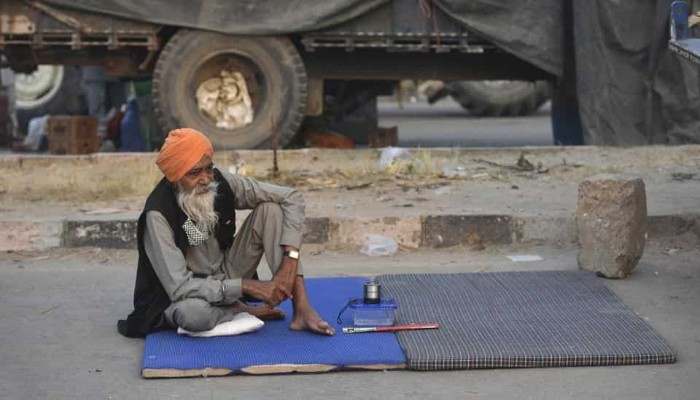New Delhi, December 02:
Farmers protesting towards a set of legal guidelines they are saying will harm their incomes agreed, at a gathering led by three Union ministers on Tuesday, to proceed discussions with the federal government later this week, however rejected a proposal from the Centre for a five-member committee of officers, economists and farmers’ representatives to carry future negotiations.
Farm union leaders from 35 organisations based mostly in Punjab and Haryana met agriculture minister Narendra Tomar, railways, meals and shopper affairs minister Piyush Goyal and minister of state for commerce Som Prakash for over three hours on the capital’s Vigyan Bhawan, as protests by 1000’s of farmers on Delhi’s borders entered the sixth day.
The authorities and the farm leaders agreed to fulfill once more on December 3 to for discussions, the federal government mentioned in a press release.
Behind the scenes, the talks had been facilitated by a number of rounds of telephone conversations between Union dwelling minister Amit Shah and key farm union leaders over the course of the previous two days, which led to the federal government advancing the date of the talks, initially scheduled for December 3.
“We were initially reluctant for another round of talks. Home minister Amit Shah talked to us several times by telephone. We agreed on the ground that the government should rethink the three farm laws,” mentioned Jagmohan Singh, a pacesetter of the Bharatiya Kisan Union (BKU) and dealing committee member of the All-India Kisan Sangharsh Coordination Committee (AIKSCC), the platform spearheading the agitation.
The farmers didn’t conform to the federal government’s proposal for a committee to hold out future talks as a result of “all 35 farmers’ leaders will have to be present in all future discussions”, mentioned Balbir Singh Rajewal, a farm chief who leads the Rajewal faction of the BKU.
“During the deliberations, the Union agriculture and farmers welfare minister proposed to constitute an expert committee to put forth the issues of farmers so as to resolve them with mutual consent but the representative of the farmers’ union suggested that all the representatives will attend further round of discussions with the government to resolve the matter amicably,” an official assertion on the finish of the talks mentioned.
Agriculture minister Tomar began Tuesday’s discussions by spelling out the federal government’s “seriousness to deal with farmers’ problems” in addition to the resolve to “listen to farmers and their demands”, an official mentioned, requesting anonymity. Agriculture secretary Sanjay Agarwal additionally outlined the federal government’s initiatives within the farm sector.
The agriculture minister recommended that farm leaders determine particular points associated to the three farm reform legal guidelines and share these with the federal government on Wednesday for consideration. “These issues will be discussed during the fourth round of meeting to be held on December 3,” the official cited above mentioned.
Darshan Pal, a farm chief representing the Krantikari Kisan Union, mentioned the farmers had been prepared with their key calls for.
“We are still saying we don’t want these laws. However, the government insisted that the laws were in the interest of farmers. We will discuss the outcome of today’s meeting when we go back,” Pal mentioned.
Farmers need the Narendra Modi authorities to revoke three contentious legal guidelines accredited by Parliament in September.
The legal guidelines basically change the way in which India’s farmers do enterprise by creating free markets, versus a community of decades-old, government-controlled agricultural markets. These legal guidelines are The Farmers’ Produce Trade and Commerce (Promotion and Facilitation) Act, 2020, the Farmers (Empowerment and Protection) Agreement on Price Assurance and Farm Services Act, 2020 and the Essential Commodities (Amendment) Act, 2020.
Together, the legal guidelines permit companies to freely commerce farm produce outdoors the so-called government-controlled “mandi system”, allow personal merchants to stockpile massive portions of important commodities for future gross sales, which earlier solely government-approved brokers may, and lay down new guidelines for contract farming.
Farmers say the reforms would make them susceptible to exploitation by large companies, erode their bargaining energy and weaken the federal government’s procurement system, whereby the federal government buys staples, comparable to wheat and rice, at assured costs.
On Monday, Prime Minister Narendra Modi, talking in Varanasi, slammed Opposition events for deceptive farmers and defended his farm legal guidelines as “historic”. He mentioned the opposition had created unfounded fears within the minds of the farmers and insisted that assist costs and procurement of staples by the federal government would proceed
(Courtesy Hindustan Times)




